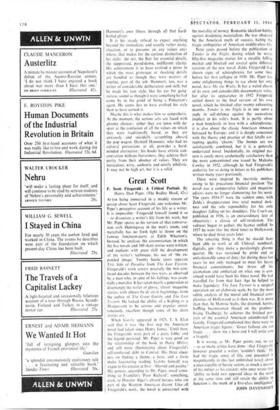Great Scott
AFTER being immersed in a muddy stream of gossip about Scott Fitzgerald, one welcomes Mr. Piper's perceptive account of his life as a writer. It is impossible—Fitzgerald himself found it so —to dissociate a writer's life from his work, but Mr. Piper spares us his version of that conversa- tion with Hemingway in the men's room, and mercifully has no fresh light to throw on the famous luncheon-party at Edith Wharton's. Instead, he analyses the circumstances in which the five novels and 160 short stories were written; and explains with great skill the development of the writer's technique, his use of 'the ex- panded image.' Twenty hectic years separate This Side of Paradise from The Last Tycoon. Fitzgerald's work covers precisely the two con- fused decades between the two wars, as observed by a man who, in spite of his failings, was essen- tially a moralist. It has taken nearly a generation to disentangle the writer of glossy, 'clever' magazine stories, with almost fin de siecle beginnings, from the author of The Great Gatsby and The Last Tycoon. He lacked the ability of a Kipling or a Maupassant to be serious and popular simul- taneously, excellent though some of his short stories are.
When Gatsby appeared in 1925, T. S. Eliot said that it was 'the first step the American novel had taken since Henry James.' Until then, the Fitzgeralds were part of a jazzy fable; and the legend persisted. Mr. Piper is very good on the relationship of the book to Daisy Miller; and still more illuminating about Fitzgerald's self-confessed debt to Conrad. His three chirp- ters on finding a theme, a hero, and a form make fascinating reading. Gatsby himself was vague to his creator at first—`blurred and patchy.' His genesis, according to Mr. Piper, owed some- thing to Franklin's 'Poor Richard'; something, even, to Horatio Alger's absurd heroes, who are part of the Western American dream. Like.all Fitzgerald's work, the novel is concerned with the morality of money. Romantic idealism battles against deadening materialism. He was obsessed by the American myth of success, hating the tragic ambiguities of American middle-class life.
Nine years passed before the publication of Tender is the Night, during which he wrote fifty-five magazine stories for a steadily falling market and blocked out several quite different versions of the new novel. Zelda Fitzgerald had shown signs of schizophrenia for some time before her first collapse in 1930. Mr. Piper has some enlightening things to say about her only novel, Save Me the Waltz. It has a weird charm of its own, and considerable documentary value, for after its appearance in 1932 Fitzgerald settled down to the final version of his own novel, which he finished after twenty exhausting months. Tender is the Night is in one sense a reply in self-defence against the accusations implicit in his wife's book. It is partly about a man hopelessly in love with a schizophrenic; it is also about the classic American innocent betrayed by Europe; and it is deeply concerned with the theory and practice of that fatally cor- rupting quality 'charm.' The themes are not satisfactorily combined, but it is a generally underrated novel. Incidentally, its original pat- tern is surely more aesthetically satisfactory-than the more conventional one issued by Malcolm Cowley in 1952, although he had Fitzgerald's authority for so doing in letters to his publishers written many years previously.
These were inspired by inartistic !natives
owing to his precarious financial positiori.--The novel was a comparative failure and magazine editors were no longer clamouring for his work. The years 1934-37 were the saddest ones, with Zelda's disappearance into total mental dark- ness and the sole reponsibility for his only daughter falling on his shoulders. The Crack-up, published in 1936, is an extraordinary feat of objectivity: a classic of self-revelation: , The vultures began to gather; the hyenas sniffed. In 1937 he went (for the third time) to Hollywood, where he died three years later.
The amazing thing is that he should have
been able to work at all. Chloral, nembutal, digitalis, gin—they make a paralysingly gloomy quartet. He was sustained by pride' and an unfashionable sense of duty; for during these last years he not only managed to meet his heavy financial commitments, but threw off his alcoholism and embarked on what one is con- vinced would have been his finest novel. He had travelled far from that Jazz Age he helped to make legendary. The Last Tycoon is a surgical operation on an elaborate scale, by far the most subtle analysis of the moral and financial com- plexities of Hollywood as it then was. It is more than that. In Monroe Stahr, the doomed, heroic, baffling businessman (based on the producer Irving Thalberg), he achieves the finished por- trait of the essential American adumbrated by Gatsby. Fitzgerald complained that there were no American tragic figures: 'Great failures are not tragic . . . show me a hero and I will write you a tragedy.'
It is wrong, as Mr. Piper points out, to say —as so many critics have done—that Fitzgerald, however graceful a writer, 'couldn't think.' He
had the tragic sense of life, and presented it
magnificently in this last unfinished novel, about a man capable of heroic action, as much a master of his métier as his creator; who once wrote that 'ability to hold two opposed ideas in the mind at the same time and still retain the ability to function is; the mark of a first-class intelligence. JOHN DAVENPORT


































 Previous page
Previous page